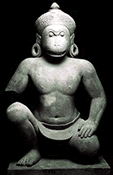With
limbs as sturdy as From the Hanuman Chalisa* |
 |
Hanuman Angkor Wat |
Hanuman Jayanti is celebrated to commemorate the birth of Hanuman, the Hindu monkey-headed god. Observed during the month of Chaitra, it is especially important to Brahmacharis,** wrestlers and bodybuilders.
In the epic Ramayana, Hanuman is the heroic figure who tracks down Rama’s wife Sita following her abduction by Ravana, the demon king. He became a legend for his unflinching loyalty to Rama and, believed to be an avatar of the god Shiva, he is worshipped as a symbol of physical strength, perseverance and devotion.
Legend tells that one of the gods had an attendant who was cursed to assume the form of a monkey, an enchantment that would only be lifted if she would give birth to an incarnation of Lord Shiva. It was while she was performing austerities to please this god that a drop of sacred pudding carried by an eagle fell into her hand, a divine ambrosia that impregnated her with Hanuman. Thus did Shiva incarnate as a monkey, and following Hanuman’s birth his mother was released from her curse.
Hindu temples throughout the world will observe Hanuman’s birthday with special prayers and recitation of the Hanuman Chalisa. It is said that when Sita was applying sindoor*** to her forehead, she told the curious monkey-god that she was performing this ritual to ensure a long life for her husband. On hearing this, and in an attempt to ensure Rama’s immortality, the devoted Hanuman smeared his entire body with the red pigment. In honour of this, when priests bathe his statue on Hanuman Jayanti they cover it in oil and sindoor, allowing devotees to obtain a smear of the powder considered to be especially auspicious.
**‘One who abides in Brahman’ (i.e. absolute reality); celibate disciples who have given up material possessions to devote their life to spiritual study.
***Red powder applied as a dot on the forehead by a married woman as a visible expression of her desire for her husband’s longevity.